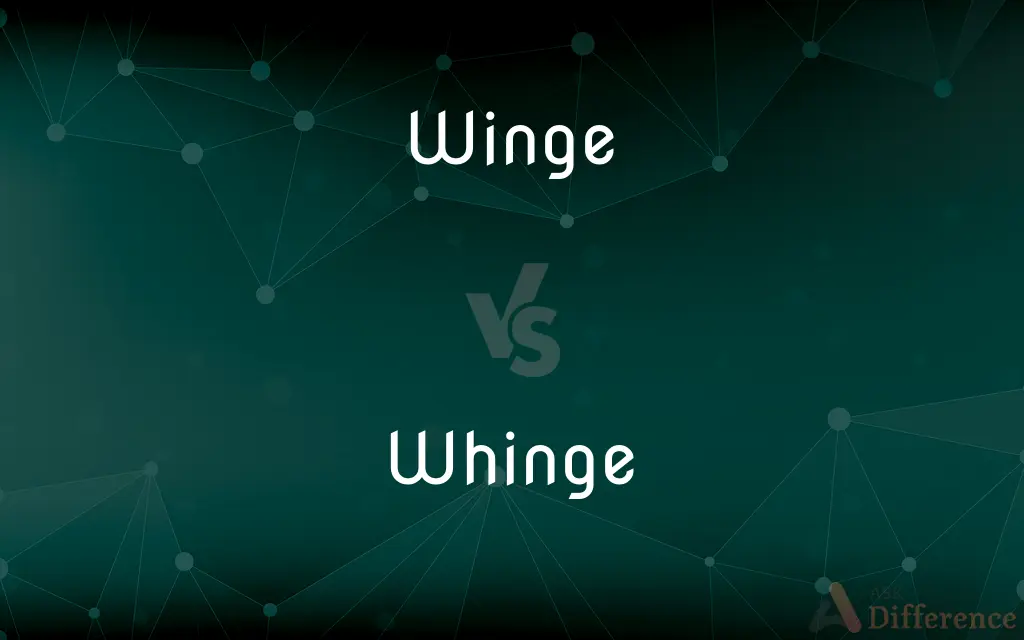Winge vs. Whinge — What's the Difference?
Edited by Tayyaba Rehman — By Urooj Arif — Updated on March 18, 2024
"Winge" is a common misspelling of "whinge," which means to complain persistently and in a peevish or irritating way.

Difference Between Winge and Whinge
Table of Contents
ADVERTISEMENT
Key Differences
Whinge is the correct spelling for the verb that describes the act of complaining in a persistent, annoying, or discontented manner. It is primarily used in British English and conveys a sense of grumbling about trivial matters. The term "winge," often mistaken for "whinge," is not recognized as a standard word in English dictionaries and may result from phonetic confusion or spelling variations.
The use of "whinge" typically implies a more nagging, continuous kind of complaining compared to the more common "complain," which can be used in a broader range of contexts and may not carry the same connotation of pettiness or irritation. In contrast, "winge" does not hold any recognized meaning in English and is generally considered a misspelling when encountered in text.
Understanding the context and correct usage of "whinge" is important, especially in British English where it is more prevalent, to convey the precise nature of the complaint being made. Misusing "winge" for "whinge" could lead to confusion or misinterpretation due to its unrecognized status in the English lexicon.
In literature and everyday conversation, particularly within the UK and Commonwealth countries, "whinge" is employed to characterize complaints that are seen as minor, excessive, or unwarranted, distinguishing them from more justified or significant grievances. The misspelling "winge," however, would likely be corrected in formal writing and editing processes to uphold the integrity and clarity of the communication.
While "whinge" has a clear role in expressing a specific type of complaining behavior, the misuse of "winge" illustrates the challenges of English spelling and the importance of understanding word origins and correct forms to maintain effective and accurate communication.
ADVERTISEMENT
Comparison Chart
Definition
To complain persistently and peevishly.
Common misspelling of "whinge."
Usage
Common in British English for trivial complaints.
Incorrect form, not recognized in standard English.
Connotation
Nagging, trivial complaints.
Lacks a recognized meaning.
Context
Used in formal and informal language to describe petty grievances.
Generally considered a mistake and corrected in formal contexts.
Importance
Highlights the nature of the complaint as minor or irritating.
Illustrates the challenges of English spelling and the importance of accuracy.
Compare with Definitions
Winge
Results from phonetic confusion.
The misspelling winge may arise from misunderstanding the pronunciation.
Whinge
British English for petty complaints.
Her constant whingeing about the service was unwarranted.
Winge
Incorrect spelling of "whinge."
Winge is often corrected to whinge in formal writing.
Whinge
Different from broader complaining.
Unlike complaints, whinges are often about trivial matters.
Winge
Highlights spelling challenges.
The confusion between winge and whinge showcases English spelling complexities.
Whinge
Characterized by peevishness.
Whingeing about small inconveniences is his habit.
Winge
Not recognized in English dictionaries.
Searching for winge in the dictionary directs to whinge.
Whinge
Can be seen as nagging.
The child's whinge for candy was incessant.
Winge
May be corrected in editing.
Editors frequently replace winge with the correct form whinge.
Whinge
To complain in an annoying manner.
He tends to whinge about the weather.
Winge
Winge is a surname.
Whinge
Complain persistently and in a peevish or irritating way
Stop whingeing and get on with it!
Winge
Alternative form of whinge
Whinge
An act of complaining persistently and peevishly
She let off steam by having a good whinge
Whinge
To complain or protest, especially in an annoying or persistent manner.
Whinge
To whine; to complain, especially in an annoying or persistent manner.
Argh! He has been whinging about it all night, even though he knows there's nothing we can do.
I know it won't help but sometimes it feels better to whinge about the things that annoy me.
Whinge
A cry.
Her whinges grew even shriller and more annoying the longer we had to listen to them.
Whinge
A peevish complaint.
I know you don't like it, but your whinges won't solve the problem!
Whinge
To whine.
Common Curiosities
How is "whinge" used differently from "complain"?
"Whinge" specifically denotes nagging or petty complaints, while "complain" has a broader application and may not imply triviality.
Is "winge" a correct spelling?
No, "winge" is a common misspelling of "whinge" and is not recognized as a correct form in standard English.
Why do people confuse "winge" with "whinge"?
The confusion often arises from phonetic similarities and unfamiliarity with the less commonly used "whinge," leading to misspellings.
Can "whinge" be used in formal writing?
Yes, "whinge" can be used in formal writing, especially to convey a specific tone or type of complaint, but it's more common in British English.
What does "whinge" mean?
Whinge means to complain persistently and in a peevish or trivial manner, often used in British English.
Do Americans use "whinge"?
While "whinge" is understood by Americans, it is far less common and is more characteristic of British English.
What is the origin of "whinge"?
"Whinge" originates from Middle English, related to the Old English word "hwinsian," meaning to whine or complain.
Is "winge" acceptable in any context?
"Winge" is generally considered a misspelling and would likely be corrected to "whinge" in most contexts.
How can one remember the correct spelling of "whinge"?
Associating "whinge" with "whine" can help, as both words involve complaints and share a similar spelling pattern.
What is the best way to respond to someone who "whinges"?
Responses can vary, but it's often helpful to acknowledge the complaint while steering the conversation towards more constructive or positive topics.
Share Your Discovery

Previous Comparison
Simmerstat vs. Thermostat
Next Comparison
Skin vs. FleshAuthor Spotlight
Written by
Urooj ArifUrooj is a skilled content writer at Ask Difference, known for her exceptional ability to simplify complex topics into engaging and informative content. With a passion for research and a flair for clear, concise writing, she consistently delivers articles that resonate with our diverse audience.
Edited by
Tayyaba RehmanTayyaba Rehman is a distinguished writer, currently serving as a primary contributor to askdifference.com. As a researcher in semantics and etymology, Tayyaba's passion for the complexity of languages and their distinctions has found a perfect home on the platform. Tayyaba delves into the intricacies of language, distinguishing between commonly confused words and phrases, thereby providing clarity for readers worldwide.














































